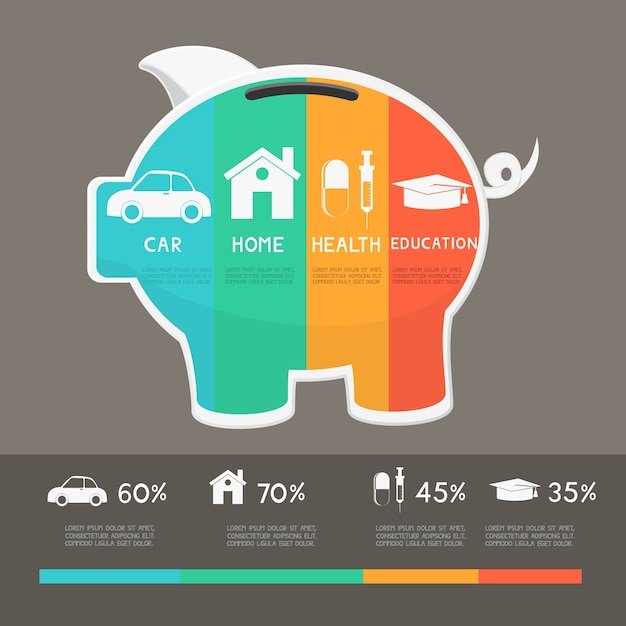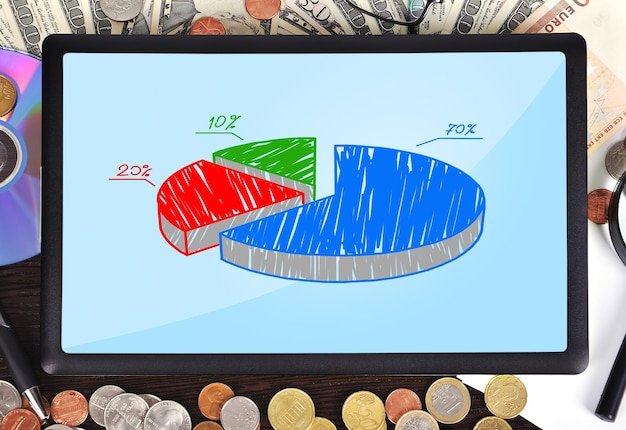Debt Management Strategies: Your 2025 Guide to Financial Freedom in the US

Debt management strategies for 2025 focus on innovative approaches, leveraging technology and personalized financial planning to reduce financial burdens and pave the way for financial freedom.
Feeling weighed down by debt? You’re not alone. Many Americans are seeking effective ways to manage their financial burdens. This guide provides you with the debt management strategies you need to navigate 2025 and pave the way towards a more secure financial future.
Understanding the US Debt Landscape in 2025
Before diving into strategies, it’s essential to understand the current debt environment in the US. Consumer debt continues to be a significant concern, impacting individuals and families across the nation. Understanding the trends and challenges can help you make informed decisions.
Key Debt Statistics in 2025
Staying informed about the latest debt statistics can put your own financial situation into perspective. Here are some key trends to consider:
- Rising Credit Card Debt: Credit card balances are on the rise, driven by inflation and increased spending.
- Student Loan Burden: Student loan debt remains a significant challenge for many Americans, impacting their ability to save and invest.
- Auto Loan Increases: Auto loan debt is also increasing, reflecting the rising cost of vehicles and higher interest rates.
These trends highlight the importance of proactive debt management. By understanding the landscape, you can tailor your strategies to address your specific financial needs.

Factors Contributing to Debt
Several factors contribute to the accumulation of debt. Recognizing these factors can help you identify potential pitfalls and develop strategies to avoid them:
- Unexpected Expenses: Medical bills, car repairs, and other unexpected expenses can quickly lead to debt if you’re not prepared.
- Overspending: Overspending on non-essential items can strain your budget and lead to credit card debt.
- Lack of Budgeting: Without a clear budget, it’s easy to lose track of your spending and accumulate debt without realizing it.
Being aware of these contributing factors is the first step towards effective debt management. By addressing these issues, you can prevent future debt accumulation and focus on reducing your existing debt.
In conclusion, understanding the US debt landscape in 2025 involves staying informed about key statistics and recognizing the factors that contribute to debt accumulation. This knowledge will empower you to develop effective strategies for managing your finances and achieving your financial goals.
Creating a Realistic Budget for Debt Reduction
A budget is the cornerstone of any effective debt management strategy. It provides a clear picture of your income and expenses, allowing you to identify areas where you can cut back and allocate more funds towards debt repayment.
Tracking Your Income and Expenses
The first step in creating a budget is to track your income and expenses. This will give you a clear understanding of where your money is going.
Use budgeting apps, spreadsheets, or even a simple notebook to record every dollar you earn and spend. Be sure to include all sources of income, such as your salary, side hustles, and investment income. Also, track all your expenses, including fixed expenses like rent and utilities, as well as variable expenses like groceries and entertainment.
Identifying Areas for Savings
Once you have a clear picture of your income and expenses, you can start identifying areas where you can save money. Look for non-essential expenses that you can cut back or eliminate. Here are some ideas:
- Dining Out: Reduce the number of times you eat out each month.
- Entertainment: Find free or low-cost entertainment options.
- Subscriptions: Cancel subscriptions you no longer use or need.
Even small savings can add up over time. By making conscious choices about your spending, you can free up more money to put towards debt repayment.

Setting Realistic Financial Goals
Setting realistic financial goals is crucial for staying motivated and on track with your debt reduction efforts. Here’s how to set achievable goals:
- Start Small: Begin with small, manageable goals, such as paying off one credit card or saving a certain amount each month.
- Be Specific: Define your goals clearly, including the amount of debt you want to pay off and the timeline for achieving your goals.
- Track Your Progress: Monitor your progress regularly and celebrate your successes along the way.
Achieving small goals will build momentum and keep you motivated to continue working towards your larger financial objectives. Remember, it’s important to be patient and persistent. Debt reduction takes time, but with a well-defined budget and realistic goals, you can achieve your financial aspirations.
In summary, creating a realistic budget for debt reduction involves tracking your income and expenses, identifying areas for savings, and setting achievable financial goals. With a well-thought-out budget, you can take control of your finances and begin the journey towards debt freedom.
Debt Consolidation Strategies for 2025
Debt consolidation involves combining multiple debts into a single, more manageable loan. This strategy can simplify your finances and potentially lower your interest rates, making it easier to pay off your debt.
Understanding Debt Consolidation Loans
Debt consolidation loans are typically offered by banks, credit unions, and online lenders. These loans can be secured or unsecured, depending on whether they require collateral. Here’s what you need to know:
- Lower Interest Rates: Debt consolidation loans often have lower interest rates than credit cards, which can save you money over time.
- Simplified Payments: With a single loan, you only have one monthly payment to keep track of.
- Fixed Payment Schedule: Debt consolidation loans usually have a fixed payment schedule, making it easier to budget and plan.
However, it’s important to shop around and compare offers from different lenders to find the best terms and interest rates.
Balance Transfer Credit Cards
Balance transfer credit cards offer another debt consolidation option. These cards allow you to transfer your existing credit card balances to a new card with a lower interest rate or promotional period. Consider these points:
- Introductory Offers: Many balance transfer cards offer 0% introductory interest rates for a limited time.
- Transfer Fees: Be aware of any balance transfer fees, which can eat into your savings.
- Credit Score Requirements: You’ll typically need a good credit score to qualify for a balance transfer card with favorable terms.
Balance transfer credit cards can be a great way to save money on interest, but it’s important to have a plan to pay off the balance before the promotional period ends.
Pros and Cons of Debt Consolidation
Before pursuing debt consolidation, it’s important to weigh the pros and cons to determine if it’s the right strategy for you.
Debt consolidation can simplify your finances and potentially save you money on interest. However, it’s important to shop around for the best terms and interest rates. In addition, remember that debt consolidation is only effective if you address the underlying causes of your debt. If you don’t change your spending habits, you may find yourself back in debt again.
In conclusion, debt consolidation can be a valuable tool for managing your debt, but it’s important to fully understand the options and consider the pros and cons before making a decision. Evaluate your financial situation and determine whether debt consolidation aligns with your overall goals.
Negotiating with Creditors for Debt Relief
Negotiating with creditors can be a proactive way to seek debt relief. Many creditors are willing to work with borrowers who are struggling to make payments, as it’s often better for them to receive partial payment than no payment at all.
Contacting Your Creditors
The first step in negotiating with creditors is to reach out to them and explain your situation. Be honest and upfront about your financial challenges. Communicate the following:
- Explain Your Situation: Clearly explain why you’re struggling to make payments, such as job loss, medical expenses, or other unexpected events.
- Be Prepared to Provide Documentation: Have documentation ready to support your claims, such as pay stubs, medical bills, or eviction notices.
This will help you establish credibility and demonstrate that you’re serious about finding a solution.
Exploring Available Options
Many creditors offer a variety of options for borrowers who are experiencing financial difficulties. Here are a few possibilities:
- Payment Plans: Request a temporary payment plan that allows you to make smaller payments for a set period of time.
- Interest Rate Reduction: Ask if the creditor is willing to lower your interest rate to make payments more affordable.
- Debt Forgiveness: In some cases, creditors may be willing to forgive a portion of your debt.
Be persistent in exploring all available options and don’t be afraid to negotiate. Even a small reduction in your debt or interest rate can make a big difference in the long run.
Negotiating with creditors can be a challenging process, but it’s worth the effort if it can help you find relief from your debt. Remember to be polite, persistent, and professional in your interactions. By working together with your creditors, you may be able to find a solution that works for both of you. Seeking professional help can be beneficial, especially if you are feeling overwhelmed.
In summary, negotiating with creditors involves contacting them, explaining your situation, and exploring available options for debt relief. By being proactive and persistent in your negotiations, you can find relief from your debt and regain control of your finances.
The Role of Credit Counseling in Debt Management
Credit counseling can be a valuable resource for individuals struggling with debt. Credit counselors are trained professionals who can help you assess your financial situation, develop a budget, and create a debt management plan.
Finding a Reputable Credit Counselor
When seeking credit counseling, it’s important to find a reputable organization that is accredited and certified. Here are some tips:
- Check Accreditation: Look for credit counseling agencies that are accredited by organizations such as the National Foundation for Credit Counseling (NFCC) or the Financial Counseling Association of America (FCAA).
- Verify Certifications: Ensure that the counselors are certified and experienced in providing debt management services.
A reputable credit counselor will provide unbiased advice and help you develop a customized plan to address your specific financial needs.
Benefits of Credit Counseling
Credit counseling can provide a wide range of benefits, including:
- Financial Assessment: Credit counselors can help you assess your financial situation and identify the root causes of your debt.
- Budgeting Assistance: They can assist you in creating a budget that is tailored to your income and expenses.
- Debt Management Plans (DMPs): Credit counselors can work with your creditors to negotiate lower interest rates and create a DMP that allows you to pay off your debt over time.
With a DMP, you make a single monthly payment to the credit counseling agency, which then distributes the funds to your creditors. This can simplify your finances and potentially save you money on interest.
What to Expect During a Credit Counseling Session
During a credit counseling session, you can expect to discuss your financial situation in detail with the counselor. The counselor will ask you questions about your income, expenses, debts, and assets. Be prepared to provide accurate information and be open and honest about your financial challenges in detail.
Credit counseling can be a valuable tool for overcoming debt and gaining control of your finances. It’s important to do your research and find a reputable organization with certified counselors. By working with a credit counselor, you can develop a personalized plan to address your specific financial needs and achieve your goals.
In conclusion, credit counseling plays a crucial role in debt management by providing individuals with the knowledge, tools, and support they need to overcome debt and achieve financial stability. Consider seeking credit counseling if you’re struggling to manage your debt on your own.
Leveraging Technology for Effective Debt Management
In 2025, technology plays a significant role in effective debt management. Numerous apps, software programs, and online tools are available to help you track your spending, create a budget, and manage your debt.
Budgeting Apps and Software
Budgeting apps and software can simplify the process of tracking your income and expenses and creating a budget. These tools offer a range of features, including:
- Automatic Transaction Tracking: Many apps automatically track your transactions from your bank accounts and credit cards.
- Budgeting Templates: They provide pre-built budgeting templates and customizable categories.
- Goal Setting: You can set financial goals and track your progress towards achieving them.
Popular budgeting apps include Mint, YNAB (You Need A Budget), and Personal Capital. Experiment with different apps to find one that suits your needs and preferences.
Debt Management Tools
In addition to budgeting apps, several debt management tools are available to help you track your debt and create a repayment plan. These tools can:
- Calculate Debt Payoff Scenarios: They can calculate how long it will take to pay off your debt using different repayment strategies, such as the debt snowball or debt avalanche method.
- Track Debt Balances: They can help you track your debt balances, interest rates, and payment due dates.
These tools can provide valuable insights into your debt and help you stay motivated and on track with your repayment goals.
Technology can be a powerful tool for effective debt management. Explore the available apps, software programs, and online resources and incorporate them into your financial routine. With the right technology, you can simplify the process of budgeting, tracking your debt, and achieving your financial goals.
In summary, in 2025, leveraging technology for debt management is essential. Budgeting apps, debt management tools, and online resources can help you take control of your finances and achieve your debt reduction goals.
| Key Point | Brief Description |
|---|---|
| 📊 Budgeting | Create a realistic budget to track income and expenses for effective debt reduction. |
| 🤝 Negotiation | Negotiate with creditors for lower interest rates or payment plans. |
| 📱 Technology | Use budgeting apps and debt management tools to track and manage finances. |
| 🧑💼 Credit Counseling | Seek guidance from reputable credit counselors for personalized debt management strategies. |
FAQ
▼
Debt consolidation combines multiple debts into a single loan, simplifying payments and often resulting in lower interest rates, making debt repayment more manageable and cost-effective.
▼
Budgeting helps in debt reduction by providing a clear picture of income versus expenses, allowing for identification of areas to cut back and allocate more funds towards debt repayment.
▼
Yes, negotiating with creditors is possible. Many are willing to work with borrowers by offering reduced interest rates, payment plans, or even debt forgiveness in some cases.
▼
Technology offers various apps and tools to track spending, create budgets, and manage debt effectively, providing insights into finances and automating repayment strategies for better control.
▼
Consider credit counseling when you feel overwhelmed by debt, struggle to manage finances, or need expert advice on creating a personalized debt management plan with creditor negotiations.
Conclusion
Managing debt in 2025 requires a multifaceted approach that combines budgeting, strategic consolidation, negotiation with creditors, leveraging technology, and, when needed, seeking guidance from credit counseling. By implementing these debt management strategies, you can gain control of your finances, reduce your debt burden, and pave the way for a brighter financial future.





